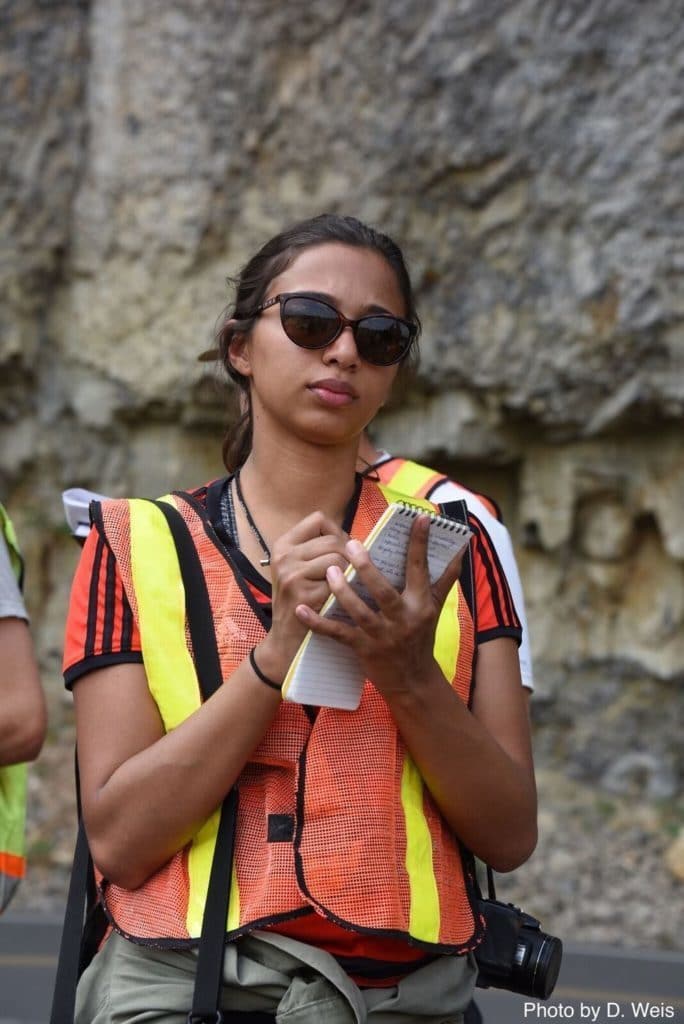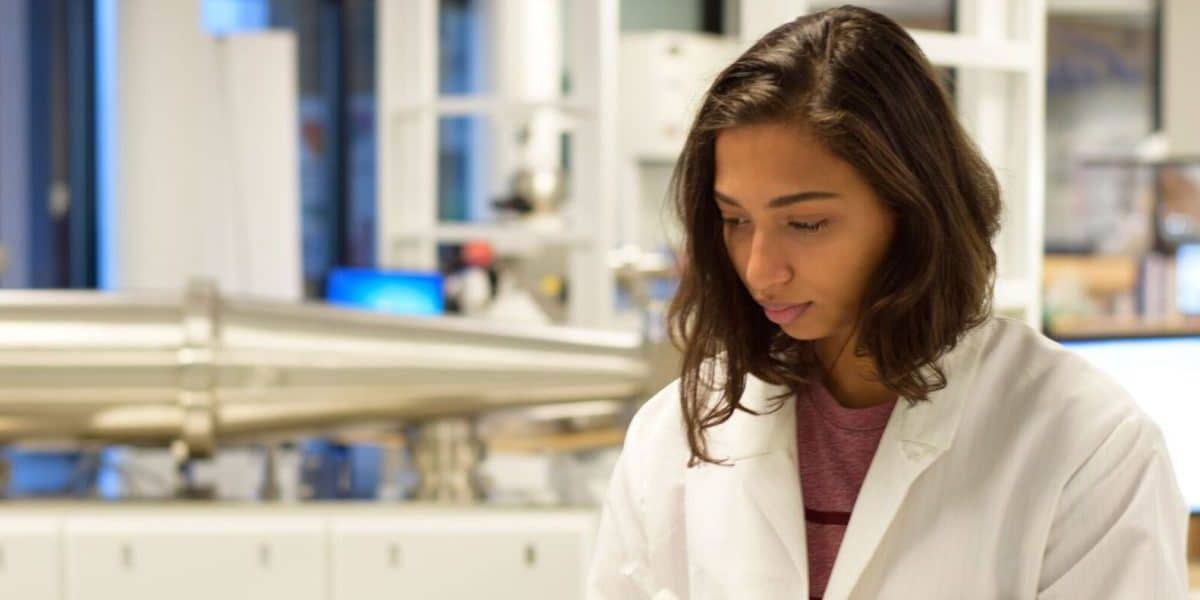Eighteen years ago in a hot backyard in Rio, Brazil, Evelyn Frères was crouched down in the grass, feverishly digging through the lawn with her hands. As the dirt piled up beside her, she felt her fingers hit something hard. As she started uncovering the solid surface, she saw one toe print emerge, then two, then four.
She’d finally found what she was looking for.
“Grandma, look!” Evelyn cried out, pointing to a perfectly preserved paw print. “I found a dinosaur paw!”

Photo by D. Weis
Years later, Evelyn realised it was just a dog’s paw print in her grandmother’s concrete foundation, but at the time – she was sure she’d hit the next big find.
“I was looking for fossils,” Evelyn said, laughing. “It was ridiculous, and I would make a mess in my grandmother’s yard…She’d indulge me.”
Although she never did find any fossils, Evelyn continued to be dedicated and enthusiastic in her endeavours, and has channelled that energy into a successful academic career in geochemistry.
To add to her list of accomplishments, Evelyn also recently won our Data Speaks! contest held at the 2018 Resources for Future Generations conference, where our competitors were asked to share their research in a way a non-specialist audience could understand (you can watch her video below). We spoke to her to learn more about her PhD research in geochemistry, which she’s currently completing at the Pacific Centre for Isotopic and Geochemical Research at the University of British Columbia.
Evelyn is studying instrumental mass bias in Multi-Collector Inductively-Coupled-Plasma Mass Spectrometry (MC-ICP-MS); her projects focus on ensuring that the data from these analyses are as accurate as possible. Since data is the foundation that drives insights and decision making, having higher quality data enables others to make better decisions. This means Evelyn’s research could have far-reaching impacts.
“I’m not using data to answer a specific question about how our planet has been formed or what happened. But I’m trying to improve data to get the most accurate results.” Evelyn said. “My research may have an impact on so many fields and projects out there. It’s important to me that it gets out there so everyone can make use of it, and so we can understand our planet in the best possible way.”
Her PhD is being completed as part of the NSERC-funded MAGNET program.
“My former boss got an email about this program called MAGNET, which stands for the Multidisciplinary Applied Geochemistry Network.” Evelyn shared. “It was my PhD advisor’s idea actually, she got together with other geochemists across Canada and they wanted to develop a professional geochemistry network focused on training young scientists. They had a bunch of projects that they were interested in pursuing, and they started looking for students to take on those projects. It started as a 6-year program, but it lives on with the community that was created.”
Ultimately, what Evelyn’s research comes down to is being able to trust your data. When samples are analysed in the MC-ICP-MS instrument, mass fractionation can occur, which is when the composition of the sample changes while being analysed by the instrument. This in turn can throw off the measurements and produce inaccurate results. And unfortunately, scientists don’t fully understand all the changes that could occur during MC-ICP-MS analysis, which makes it challenging to correct the results.
Evelyn’s research focuses on determining what changes could occur, so that they can be minimised, or the results can be adequately corrected. “I have three different projects that I’m developing as part of my PhD,” she said. “They’re all about these different types of mass fractionation that are happening, and trying to find ways to correct for it.”
It’s important for MC-ICP-MS measurements to be accurate, as they’re used to determine isotopic ratios of samples. Isotopes are forms of the same element (like samarium, a hard silvery metal) that differ in mass, due to having a different number of neutrons. The difference in mass helps scientists uncover geological mysteries.
“For example there’s this element, samarium, and it has seven different isotopes. One of its isotopes, which has a mass of 147, loses a bit of its mass naturally. It turns into another isotope of a new element, called neodymium, which has a mass of 143. And that process happens over time.” Evelyn said. “So let’s say, hypothetically, that you have 1 gram of that 147-samarium in your sample. Over 106 billion years, which is what we call the “half-life” of that system, half of it is going to turn into 143-neodymium. By measuring how much of these isotopes are present in the sample, we can tell how long has passed since that rock was formed.”
And although Evelyn has graduated from digging around in her grandmother’s yard to operating sophisticated equipment in a white lab coat, she’s still motivated by discovery.
“You’re trying to create a method and you go through several steps. Sometimes you do something and it goes wrong. And then you do something else and it also goes wrong.” Evelyn explained. “But then, when it goes right, there’s the thrill of it… It’s the pursuit of trying to find things that are going to work. It’s the curiosity of trying to always find the best way to do things… As a chemist, I really like the idea that I’m able to help people understand our planet better.”
Main image credit: C. Kosman.
You can watch Evelyn’s 5-minute explanation of her research for our Data Speaks! Competition below.





